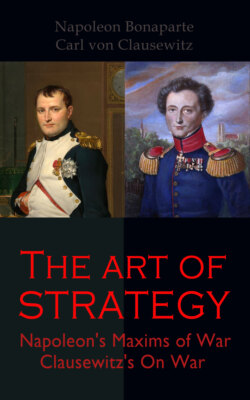Читать книгу The Art of Strategy: Napoleon's Maxims of War + Clausewitz's On War - Carl von Clausewitz - Страница 114
На сайте Литреса книга снята с продажи.
23. WAR IS ALWAYS A SERIOUS MEANS FOR A SERIOUS OBJECT. ITS MORE PARTICULAR DEFINITION.
ОглавлениеSuch is War; such the Commander who conducts it; such the theory which rules it. But War is no pastime; no mere passion for venturing and winning; no work of a free enthusiasm: it is a serious means for a serious object. All that appearance which it wears from the varying hues of fortune, all that it assimilates into itself of the oscillations of passion, of courage, of imagination, of enthusiasm, are only particular properties of this means.
The War of a community—of whole Nations, and particularly of civilised Nations—always starts from a political condition, and is called forth by a political motive. It is, therefore, a political act. Now if it was a perfect, unrestrained, and absolute expression of force, as we had to deduct it from its mere conception, then the moment it is called forth by policy it would step into the place of policy, and as something quite independent of it would set it aside, and only follow its own laws, just as a mine at the moment of explosion cannot be guided into any other direction than that which has been given to it by preparatory arrangements. This is how the thing has really been viewed hitherto, whenever a want of harmony between policy and the conduct of a War has led to theoretical distinctions of the kind. But it is not so, and the idea is radically false. War in the real world, as we have already seen, is not an extreme thing which expends itself at one single discharge; it is the operation of powers which do not develop themselves completely in the same manner and in the same measure, but which at one time expand sufficiently to overcome the resistance opposed by inertia or friction, while at another they are too weak to produce an effect; it is therefore, in a certain measure, a pulsation of violent force more or less vehement, consequently making its discharges and exhausting its powers more or less quickly—in other words, conducting more or less quickly to the aim, but always lasting long enough to admit of influence being exerted on it in its course, so as to give it this or that direction, in short, to be subject to the will of a guiding intelligence., if we reflect that War has its root in a political object, then naturally this original motive which called it into existence should also continue the first and highest consideration in its conduct. Still, the political object is no despotic lawgiver on that account; it must accommodate itself to the nature of the means, and though changes in these means may involve modification in the political objective, the latter always retains a prior right to consideration. Policy, therefore, is interwoven with the whole action of War, and must exercise a continuous influence upon it, as far as the nature of the forces liberated by it will permit.
